AI/ML
Generative AI in Healthcare: How It is Changing the Way We Care!
Written ByYash Vibhandik
CEO, Bitontree
Published:16 December 2024
30 minutes read

Advancements in AI have already shown progressions in the healthcare industry. Gen AI is adding to it with its ground-breaking and innovative abilities. By generating new data, insights, and solutions based on existing information, generative AI is driving significant advancements.
These advancements comprise healthcare practices, medical research, patient care and much more. So, comprehending the applications and benefits of AI in healthcare is crucial.
By doing so you can better leverage its full potential. In this blog post, with benefits and applications, we will also explore the future of AI in healthcare.
Comprehending Generative AI in the Healthcare Industry
Generative AI in Healthcare Market size was measured $ 1.8 billion in 2023. It is anticipated to reach-out $ 22.1 billion by 2032 rising at a CAGR of around 32.6 percent.
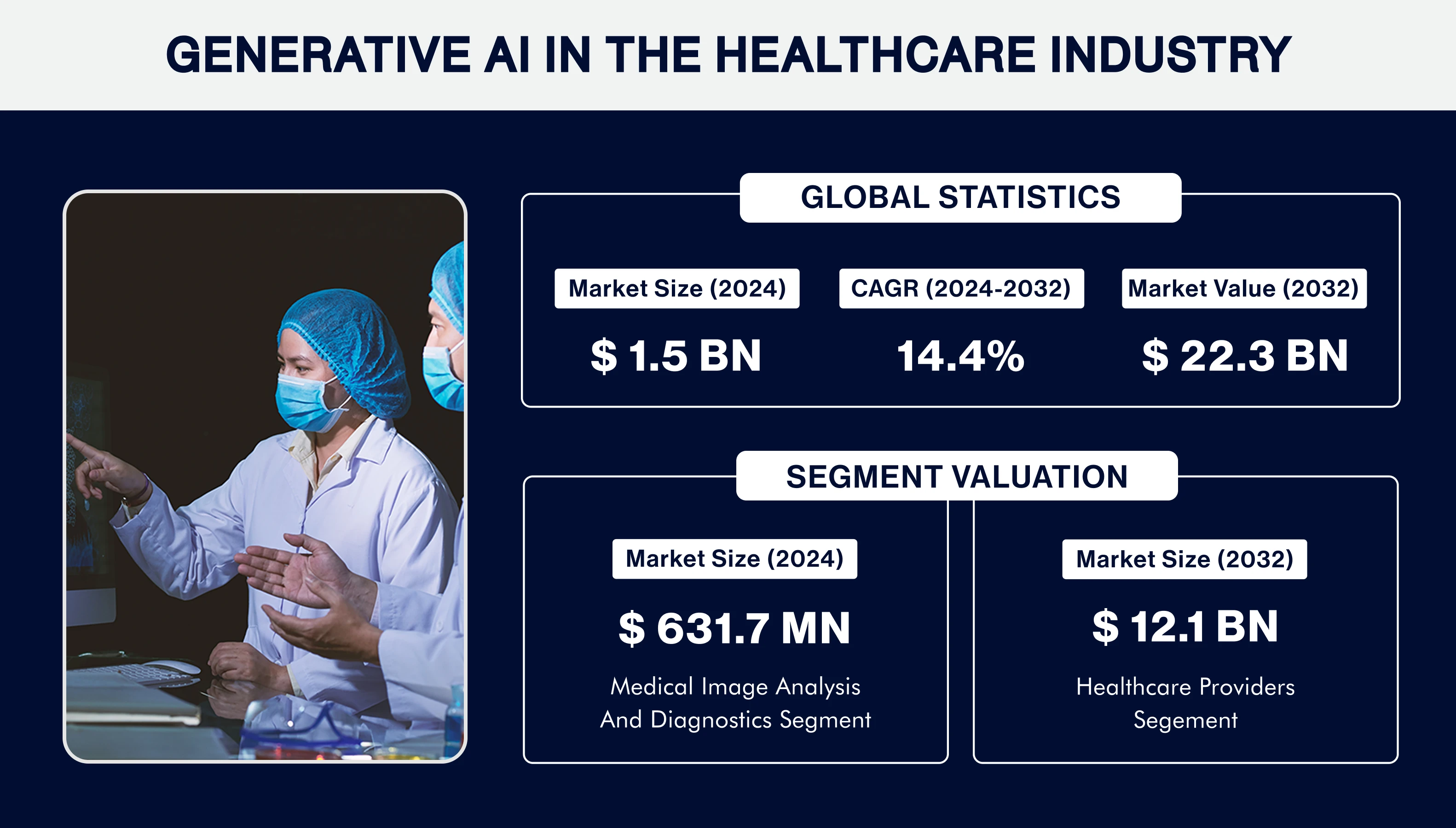
The Role of Generative AI in Enabling Healthcare Professionals
In the healthcare sector, Gen AI technology is utilized to enhance medical diagnostics. Healthcare professionals can personalize treatments and accelerate drug discovery with this advanced technology.
By processing immense volumes of medical datasets, generative AI can further categorize patterns and predict outcomes. It can help generate innovative solutions that can guide healthcare professionals at each stage and improve their efficiency levels.
Applications of Generative AI in Healthcare Domains
Gen AI is altering how healthcare solutions are delivered. Let us delve into the diverse applications of generative AI in the healthcare sector.
A.) Medical Imaging
Gen AI enhances the clarity of medical images. AI algorithms can reconstruct high-quality images from lower-resolution scans. Gen AI can identify anomalies with greater precision. It can even predict the progression of medical conditions.
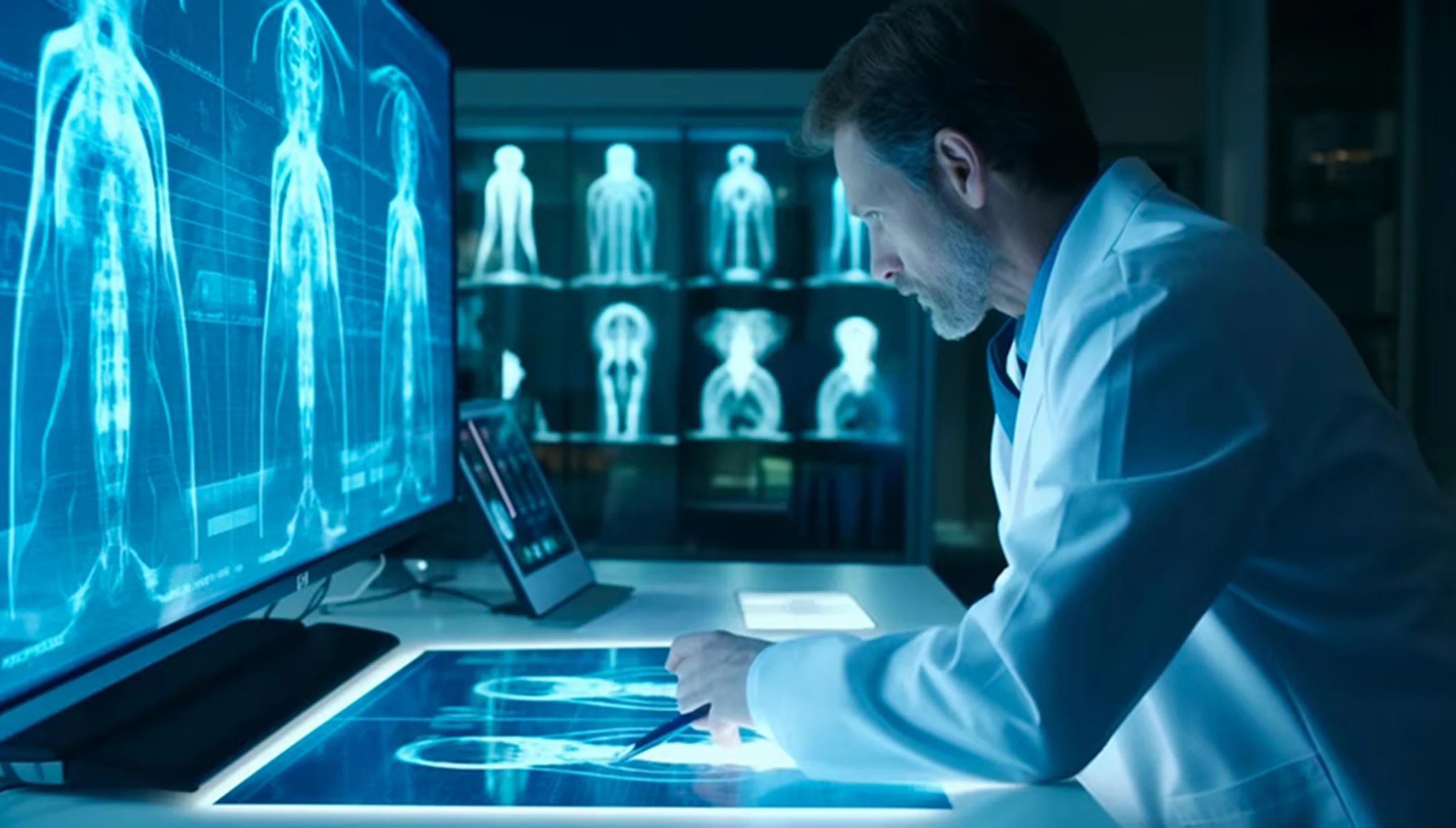
So, Generative AI for medical imaging is helping healthcare professionals. For instance, AI-driven tools can highlight potential areas of concern in radiographic images. This medical imaging application helps radiologists in early diagnosis and treatment planning.
B.) Drug Discovery and Development
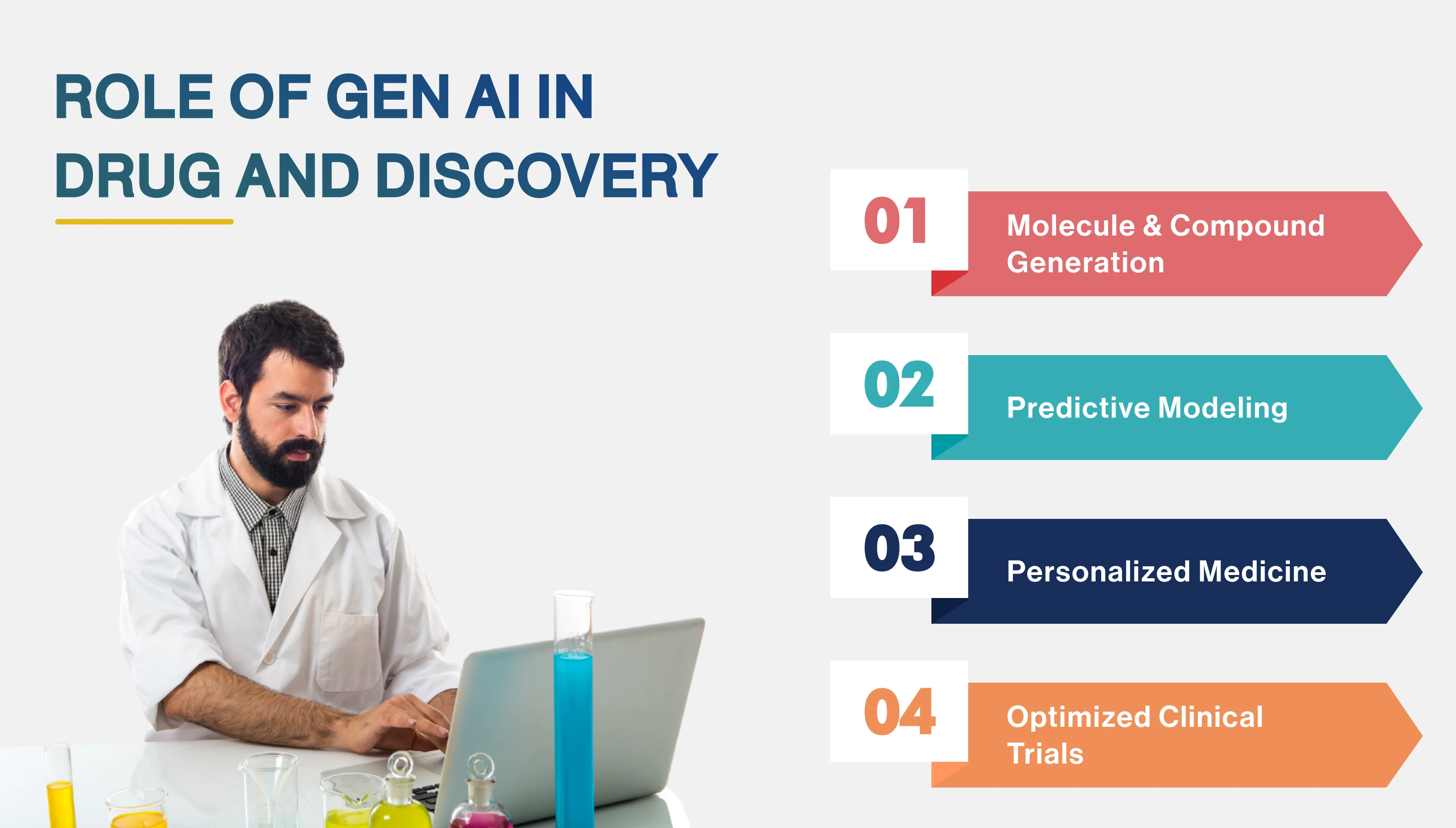
The drug discovery progressions are conventionally prolonged and costly. However, generative AI is streamlining this process. It is simulating interactions of different compounds with biological systems.
Subsequently, AI models can predict the efficacy and toxicity of new drugs. These predictions assist and enable researchers in their discoveries.
AI has already contributed to significant breakthroughs in pharmaceutical domains. These breakthroughs have reduced the time and cost in introducing new drugs.
C.) Personalized Medicine
Generative AI facilitates personalized medicine by analyzing individual patient data. These data sets include genetics, lifestyle, and medical history. AI systems can generate tailored treatment plans. These plans discourse the exclusive requirements of every patient.
This personalized approach improves patient outcomes. It ensures that treatments are more effective and have fewer side effects.
D.) Predictive Analytics and Diagnostics
Generative AI plays a central part in predictive analytics. It forecasts patient outcomes based on historical data sets.
Furthermore, AI-powered diagnostic tools can analyze symptoms and medical history. It tests results to provide accurate diagnoses. These tools even recommend appropriate treatments.
This advanced technology and tools enhance the accurateness of diagnostics. It helps healthcare providers make precise and highly informed decisions.
E.) Virtual Health Assistants
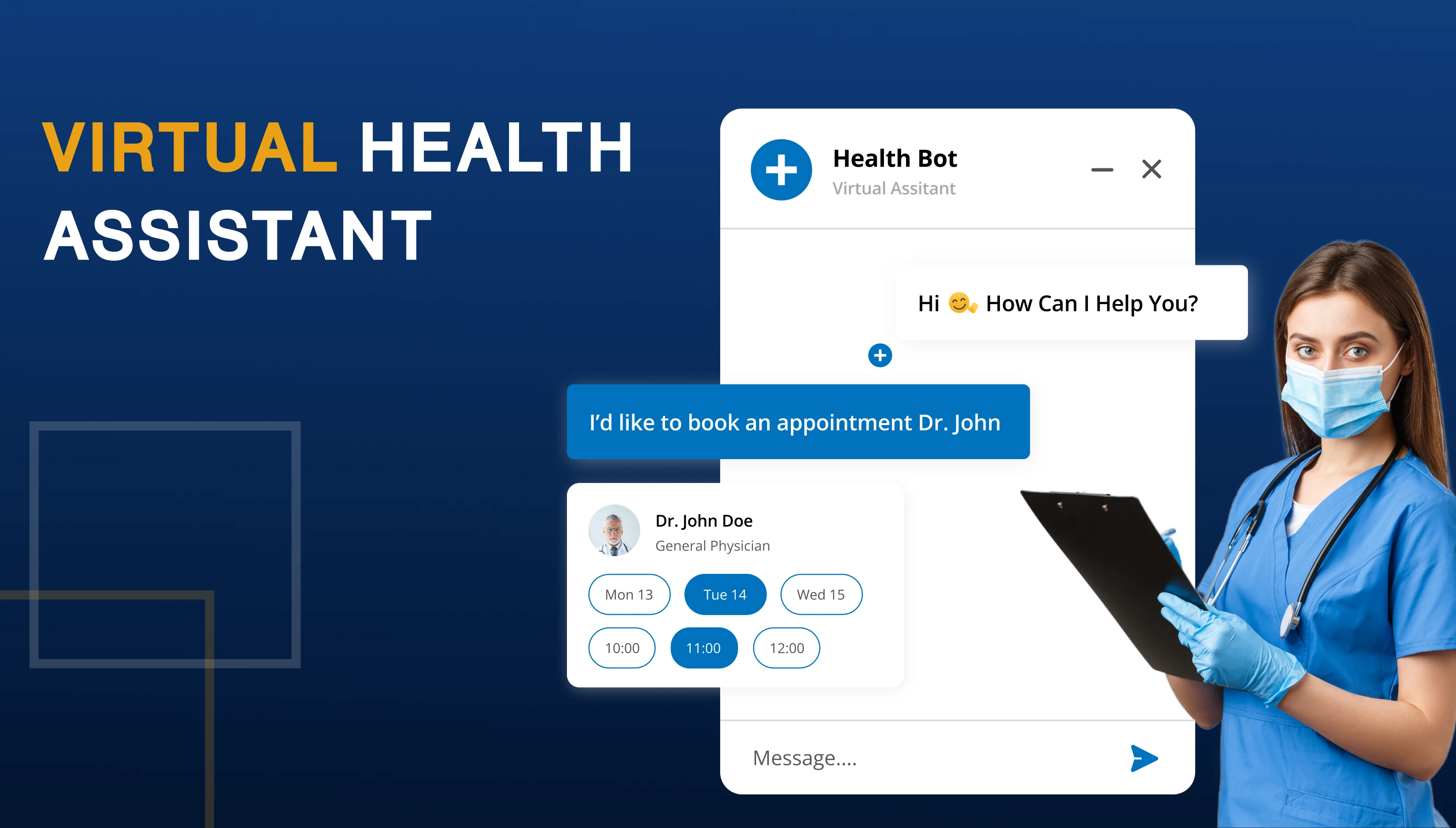
AI-driven virtual health assistants support patients by providing personalized health advice. They manage medication schedules and answer medical queries. These virtual assistants reduce the workload on healthcare professionals.
By handling routine tasks, AI solutions are enabling healthcare professionals. With AI systems they can focus on more complex cases.
Even patients benefit from timely and accurate health information through these systems. This scenario leads to better management of their conditions.
Significant Benefits of Gen AI in Healthcare
Let us uncover the significant benefits of Generative AI.
A.) Improved Precision and Proficiency
Gen AI enables the analysis of vast amounts of data quickly and explicitly. This scenario leads to more precise diagnoses and treatments.
So, Generative AI improves operational efficiency. It also helps in automating administrative tasks. All this allows healthcare professionals to focus on patient care.
B.) Cost Reduction
Integrating AI into healthcare can significantly reduce costs. It automates routine tasks and optimizes treatment plans.
Gen AI further reduces the need for unnecessary tests and treatments. Cost-saving measures enabled by AI technologies make healthcare more affordable. This scenario backs both patients and providers.
C.) Enhanced Patient Experience
Gen AI enhances the overall patient experience. It provides personalized care and improves communication. It also ensures timely interventions.
So, patients are benefiting from customized treatment plans and proactive health management. They pass through a more interactive healthcare experience through generative AI.
Consequently, Gen AI applications in patient engagement increase satisfaction. It further promotes better health outcomes.
Challenges and Ethical Considerations
Implementing Gen AI involves ensuring data privacy and managing the ethical use of AI. So, addressing potential biases in AI algorithms can be a challenge.
Healthcare organizations must adopt robust data protection measures. They must ensure that AI systems are transparent and accountable.
Ethical considerations even include ensuring that AI complements rather than replaces human judgment. Likewise, ensure this approach is used equitably across diverse patient populations. So, implementing generative AI will come with both opportunities and challenges.
The Future of AI in Healthcare
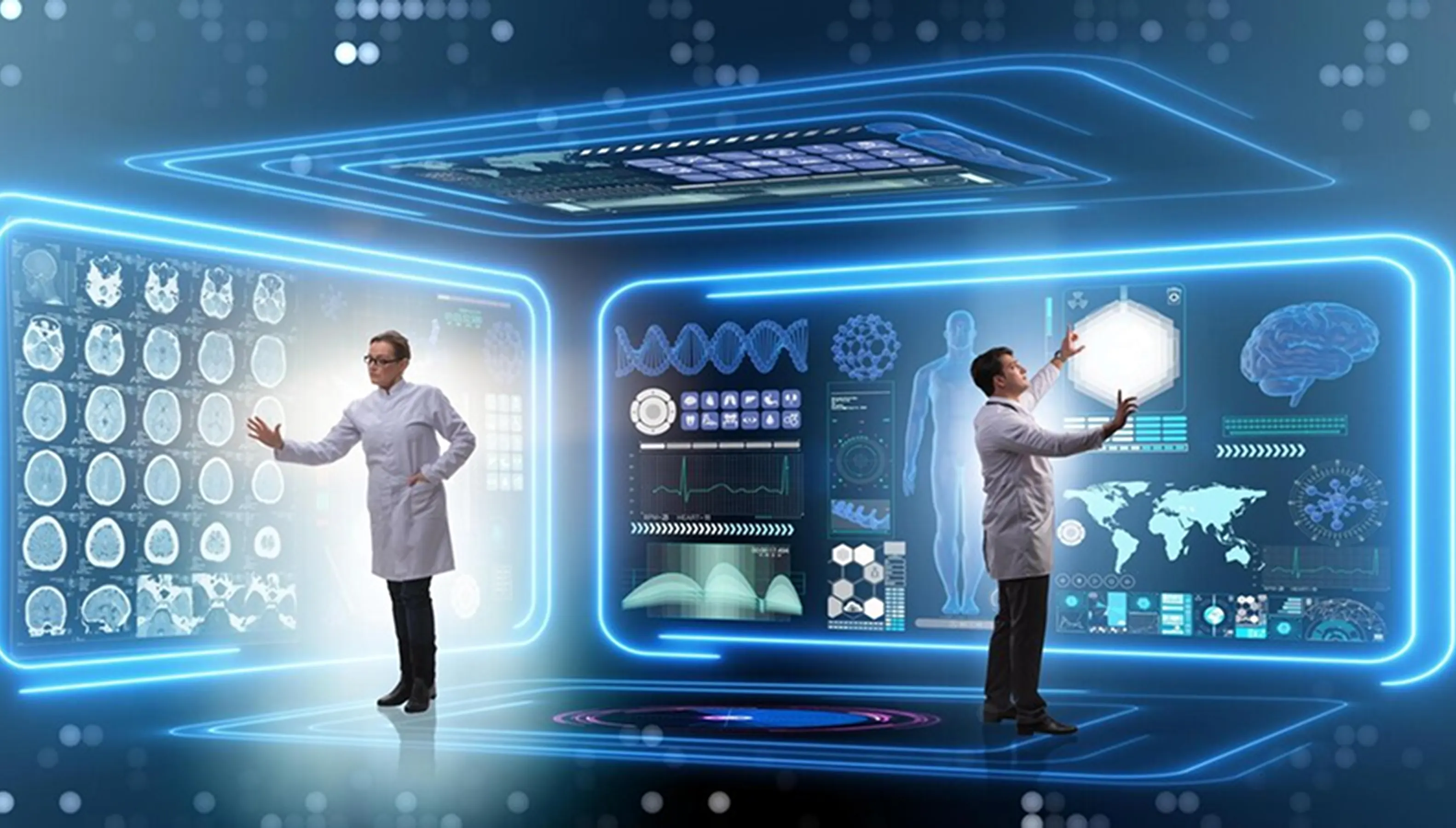
Gen AI will lead to continued advancements and innovations in the healthcare horizons. It is expected to further enhance personalized medicine and improve predictive analytics. It is also projected to drive discoveries and progressions in drug development.
The integration of AI in everyday healthcare practices will become more seamless. This scenario will lead to amended patient outcomes and operational efficiencies. So, the future of generative AI is quite promising.
Moving Forward with Gen AI Solutions in Healthcare Industry
Generative AI has the potential to transform healthcare. It will lead to more automations and enhance operational efficiencies in this domain.
As technology continues to evolve, staying informed about AI developments is the need of the hour. Understanding Gen AI implications is crucial for healthcare professionals. By embracing generative AI, the healthcare sector can achieve significant advancements. This will ultimately benefit patients and providers alike.
So, we have highlighted Gen AI applications, benefits, and future potential. If you are planning to develop or enable Generative AI projects then connect with us at Bitontree.
Our teams will support you through your complete AI journey and successfully move you forward with your next set of technology projects.
Develop the best experienced website with our services in Gen AI
Frequently Asked Questions
Generative AI is making a significant impact in the healthcare industry through a variety of applications. Some of these applications are creation of medical images, discovery of new drugs and analysis of patient data. Prediction of diseases and the simulation of virtual patients are also important use cases.
Generative AI offers numerous advantages to the healthcare sector. It enhances diagnostic precision, allows for the customization of treatment plans, speeds up the drug discovery process, cuts costs, and boosts patient outcomes. These advantages lead to a highly effective healthcare system.
Generative AI is being utilized across healthcare in innovative ways such as:
- It creates artificial medical data to train AI algorithms effectively.
- It helps in crafting individualized treatment strategies based on patient-specific data.
- It contributes in simulating surgeries, aiding in the training and preparation of medical professionals.
- It generates medical images that assist in accurate diagnosis and treatment planning.
- It is leveraged in healthcare research to improve drug discovery.
- It can be utilized to streamline health insurance procedures, prior authorization and processing of medical claims.
- AI chatbots help in scheduling and management of appointments without depending on human schedulers.
Healthcare companies looking to use Gen AI can start by leveraging their existing patient data along with their histories and pinpointing related use cases. These use cases must align with set objectives and challenges. Collaborating with an experienced generative AI development company can offer invaluable guidance, expertise and ongoing support.



